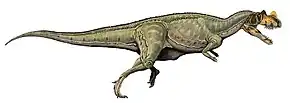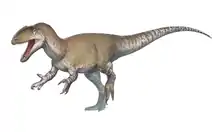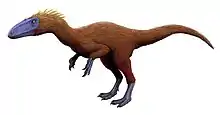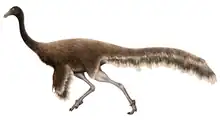| Fosterovenator Temporal range: Late Jurassic, | |
|---|---|
 | |
| Skeletal restoration | |
| Scientific classification | |
| Domain: | Eukaryota |
| Kingdom: | Animalia |
| Phylum: | Chordata |
| Clade: | Dinosauria |
| Clade: | Saurischia |
| Clade: | Theropoda |
| Clade: | †Ceratosauria |
| Genus: | †Fosterovenator Dalman, 2014 |
| Type species | |
| †Fosterovenator churei Dalman, 2014 | |

Fosterovenator (meaning "Foster's hunter") is a genus of ceratosaur dinosaur known from the Late Jurassic Morrison Formation of Wyoming. The holotype is YPM VP 058267A, B, and C, a tibia with an articulated astragalus. An additional specimen is known, the paratype YPM VP 058267D, a fibula of a larger individual.[1]
The holotype remains were discovered in 1879 by Arthur Lakes at Como Bluff, Wyoming, and consist of a nearly-complete right tibia with a co-ossified astragalus, probably of a juvenile. The paratype consists of a complete right fibula measuring 27.5 cm (10.8 in) in length and belonging to a much larger individual. The overall shape of the known material is similar to that of Elaphrosaurus.[1] However, ceratosaurian affinities of Fosterovenator (at least of the paratype) have been questioned.[2]
Etymology
The generic name Fosterovenator was named in 2014 by S. G. Dalman for John Russell Foster and the Latin word venator ("hunter"). The specific name churei is named for Daniel J. Chure.[1]
See also
References
- 1 2 3 Dalman, S.G. (2014). "New data on small theropod dinosaurs from the Upper Jurassic Morrison Formation of Como Bluff, Wyoming, USA" (PDF). Volumina Jurassica. 12 (2): 181–196.
- ↑ Skawiński, Tomasz; Ziegler, Maciej; Czepiński, Łukasz; Szermański, Marcin; Tałanda, Mateusz; Surmik, Dawid; Niedźwiedzki, Grzegorz (2016). "A re-evaluation of the historical 'dinosaur' remains from the Middle-Upper Triassic of Poland". Historical Biology. 29 (4): 442–472. doi:10.1080/08912963.2016.1188385. S2CID 133166493.

.jpg.webp)












